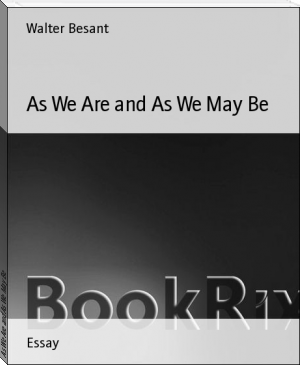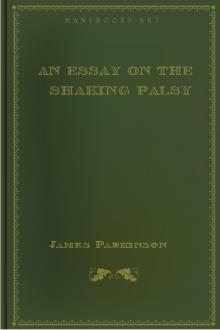As We Are and As We May Be by Walter Besant (crime books to read .txt) 📖

- Author: Walter Besant
Book online «As We Are and As We May Be by Walter Besant (crime books to read .txt) 📖». Author Walter Besant
It cannot be denied that this is a very important duty, much more important, for a special reason, in the States than it is in Great Britain. I used to marvel, before making these observations, at the constant flying of the stars and stripes everywhere; at the continual reminding as to freedom. 'Are there,' one asks, 'no other countries in the world which are free? In what single point is the freedom of the American greater than the freedom of the Briton, the Canadian, of the Australian?' In none, certainly. Yet we are not forever waving the Union Jack everywhere and calling each other brothers in our glorious liberty. Well: but let us think. In so vast a population, spread over so many States, each State being a different country, there will always be ignorant men, men ready to give up everything for a selfish advantage: there must always be a danger, unless it be continually met and beaten down, that the United may become the dis-United States. Why, European statesmen used to look forward confidently to the disruption of the States from the Declaration of Independence down to the Civil War. It was a commonplace that the country must inevitably fall to pieces. The very possibility of a disruption is now not even thought of: the thing is never mentioned. Why is this? Surely, because the idea of federation is not only taught and ground in at the elementary schools, but because the flag of federation is always displayed as the chief glory of the nation at every place where two or three Americans are gathered together. The symbol you see is unmistakable: it means Union, once for all; the word, the idea, the symbol, it must be always kept before the eyes of the people; it is in the wisdom of the rulers that the stars and stripes are forever flaunted before the eyes of the people.
And it is not only the ignorant and the selfish among Americans themselves; it is the vast number of immigrants, increasing by half a million every year, who have to be taught what citizenship means. The outward symbol is the readiest teacher; let them never forget that they live under the stars and stripes; let them learn--German, Norwegian, Italian, Irish--what it means to belong to the Great Republic. Is this all that a two months' visitor can bring away from America? It is the most important part of my plunder. What else has been gathered up is hardly worth talking about, in comparison with these two discoveries which are, after all, perhaps only useful to myself: the discovery of the real youthfulness of the country and the discovery of the real meaning and the necessity of the spread-eagle speeches and the flaunting of the flag in season and out of season. It may seem a small thing to learn, but the lesson has wholly changed my point of view. The fact is perhaps hardly worth recording; it matters little what a single Englishman thinks; but if he can induce others to think with him, or to modify their views in the same direction, it may matter a great deal.
And, of course, an Englishman must think of his own future--that of his own country. Before many years the United Kingdom must inevitably undergo great changes: the vastness of the Empire will vanish; Canada, Australia, New Zealand, South Africa will fall away and will become independent republics; what these little islands will become then, I know not. What will become of the English-speaking races, thus firmly planted over the whole globe, is a more important question. If a man had the voice of the silver-mouthed Father, if a man had the inspiration of a prophet, it would be a small thing for that man to consecrate and expend all his life, all his strength, all his soul, in the creation of a great federation of English-speaking peoples. There should be no war of tariffs between them; there should be no possibility of dispute between them; there should be as many nations separate and distinct as might please to call themselves nations; it should make no difference whether Canada was the separate dominion of Canada, or a part of the United States; it should make no difference whether Great Britain and Ireland were a monarchy or a republic. The one thing of importance would be an indestructible alliance for offence and defence among the people who have inherited the best part of the whole world. This alliance can best be forwarded by a promotion of friendship between private persons; by a constant advocacy in the press of all the countries concerned; and by the feeling, to be cultivated everywhere, that such a confederation would present to the world the greatest, strongest, wealthiest, most highly cultivated confederacy of nations that ever existed. It would be permanent, because here would be no war of aggression in tariffs, or of personal quarrel; no territorial ambitions; no conflict of kings.
Naturally, I was not called upon to speak at the Harvard dinner. Had I spoken, I should like to have said: 'Men of Harvard, grandsons of that benignant mother--still young--who sits crowned with laurels, ever fresh, on the sedgy bank of Granta, think of the country from which your fathers have sprung. Go out into the world--your world of youthful endeavour and success; do your best to bring the hearts of the people whom you will have to lead back to their kin across the seas to east and west--over the Atlantic and over the Pacific. Do your best to bring about the Indestructible fraternity of the whole English-speaking races. Do this in the sacred name of that freedom of which you have this day heard so much, and of that Christianity to which by the very stamp and seal of your college you are the avowed and sworn servants. Rah!'
[1893.]
ART AND THE PEOPLE.
[Paper read at the Birmingham Meeting of the Social Science Congress.]
There is a passage in one of the letters of Edward Denison which exactly interprets the dejection and oppression certain to fall upon one who seriously considers and personally investigates, however superficially, the condition of the poor in great cities. He writes from Philpott Street, Commercial Road, East London, and he says: 'My wits are getting blunted by the monotony and ugliness of the place. I can almost imagine the awful effect upon a human mind of never seeing anything but the meanest and vilest of men and man's work, and of complete exclusion from the sight of God's works.' The very exaggeration of these words shows the profound dejection of the writer, at a moment when his resolution to continue living in a place where there was neither nature nor art, nor beauty anywhere, weighed upon him like a penal sentence, so that the vileness of the surroundings entered into his soul and made him feel as if the men and women in the place, as well as their works, were all alike, mean, vile, and sordid. Edward Denison wrote these words seventeen years ago. The place in which he lived is still ugly and monotonous, a small cross-street leading from the back of the London Hospital into the Commercial Road, about as far from green fields and parks or gardens as can be found anywhere in London; there are still a good many of the vilest of man's works carried on in the neighbourhood, especially the making of clothes for Government contractors, and the making of shirts for private sweaters. But something has been attempted since Denison came here--the pioneer of a great invasion. Many others have followed his example, and are now, like him, living among the people. Clubs have been established, concerts and readings have been given, and excursions into the country, convalescent homes and a thousand different things have grown up for the amelioration of the poor. Better than all, there are now thousands of educated and cultivated men and women who are perpetually considering how existing evils may be remedied and new evils prevented. With philanthropic efforts, with the social questions connected with them, I have now nothing to do. We are at present only concerned with a question of Art: we are to inquire how the love and desire for Art may be introduced and developed, and to ask what has already been attempted In this direction.
I would first desire to explain that I know absolutely nothing about the state of things in any other great city of Great Britain than one. What I say is based upon such small knowledge that I may have gained concerning London, and especially East London. As regards Birmingham, Manchester, Sheffield, Glasgow, and any other place where there is a great industrial population, I know nothing. If, therefore, exception be taken to any expressions of mine as applied to some other city, I beg it to be remembered that East London alone is in my mind. Even concerning East London exception may be taken to anything I may advance. That is because it is impossible to make any general proposition whatever of humanity considered in the mass except the elementary ones, such as that all must eat and sleep, to which objection may not be raised. Thus, I know that it is true, and I am prepared to maintain the assertion, that the lower classes in London care nothing about Art, and know nothing about Art, and have only an elementary appreciation of things beautiful. It is equally true, on the other hand, that there are everywhere some whose hearts are yearning and whose hands are stretched out in prayer for greater beauty and fulness of life. It is also, as a general statement, true that there are no amusements in East London, which contains two and a half millions of people, has no municipality, and is the biggest, ugliest, and meanest city in the whole world. Yet it is equally true that there are in it institutes for education and science, art, and literature, mutual improvement societies, clubs at which there are evenings for singing, dancing, and private theatricals, and rowing, swimming, and cricket clubs. It is again, as a general rule, true that the lower classes are ignorant of science, yet there are everywhere scattered among the working men single cases of earnest devotion to science. And it is painfully true that they do not seem to feel the ugliness of their own streets and houses; yet no one who has been among the holiday folks in the country on a Bank Holiday or a fine Sunday in the summer can deny their profound appreciation of field and forest, flowers and green leaves, sunshine and shade. It is, lastly, perfectly true that their lives, compared with those of the more cultivated classes, do seem horribly dull, monotonous, and poor. Yet the dulness is more apparent than real: ugly houses and mean streets do not necessarily imply mean and ugly lives. Their days may be enlivened in a thousand ways which to the outsider are invisible. Among these are some which directly or indirectly make for the appreciation of Art.
It seems safe, however, to advance one proposition. There is a class in and below which it is impossible that there can exist a feeling for Art of ally





Comments (0)